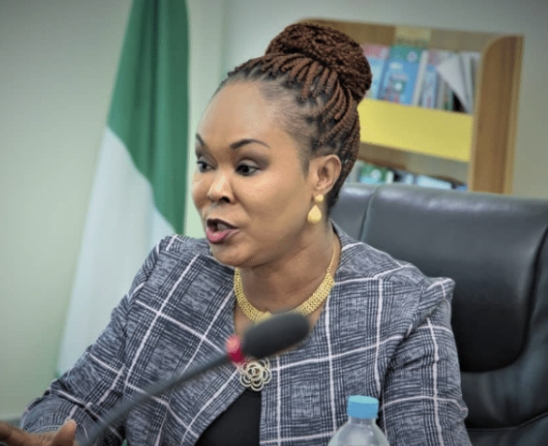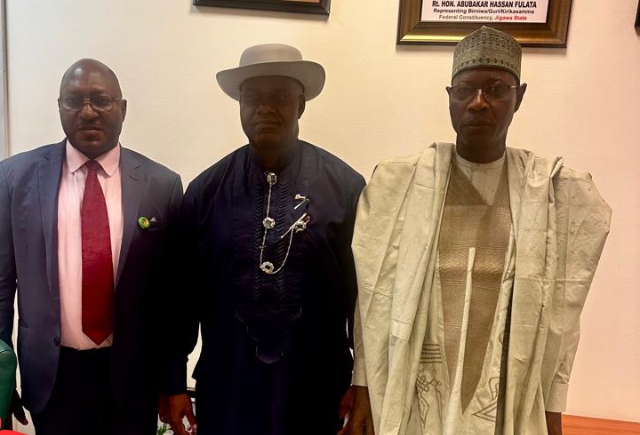News
Tinubu’s ex-minister, Uju Kennedy-Ohanenye returns to Nollywood with new movie ‘Hatred’

By Kayode Sanni-Arewa
Ex-Minister of Women Affairs and Social Development, Uju Kennedy-Ohanenye, has made a return to Nollywood with a newly released movie, Hatred.
This comes nearly five months after her dismissal by President Bola Tinubu on 24 October 2024, alongside four other ministers. She was replaced by Imaan Sulaiman-Ibrahim.
Announcing the release on her X (formerly Twitter) page on 5 February 2025, Kennedy-Ohanenye shared a link to the 40-minute film, which features Sorochi Onyekwere, Onyi Maduegbunam, Ifunanya Nwobi, and Kachi Obimma.
The former minister, a lawyer and member of the Nigerian Bar Association, has a long history in the film industry, with previous productions such as Mama Onboard, The Senator, The Governor, and The President.
She has also appeared in films like Saving My Marriage and Royal Ploy, working alongside industry veterans such as Segun Arinze and Ngozi Ezeonu.
Beyond entertainment, Kennedy-Ohanenye is active in real estate, education, and law. She runs Uju Kennedy-Ohanenye & Co., a legal firm, and is the founder of Uju Kennedy-Ohanenye Academy.
In 2023, she contested the APC presidential primaries but stepped down for President Tinubu.
News
Reps Move to Transform Micheal Okpara University to Conventional University

News
Parliamentary Oversight of Security Agencies, A Legislative Imperative – Speaker Abbas

By Gloria Ikibah
Speaker of the House of Representatives, Tajudeen Abbas, has emphasized the crucial role of parliamentary oversight in ensuring security agencies adhere to the rule of law and uphold human rights.
Speaking at a two-day workshop in Abuja, organized by the Konrad Adenauer Stiftung, Abbas, represented by Deputy Speaker Benjamin Kalu, underscored the legislature’s responsibility in monitoring security institutions to ensure they effectively safeguard citizens.
He stressed that maintaining a balance between security operations and accountability is essential for fostering public trust in government institutions. Given the technical nature of the security sector, he noted that lawmakers must be equipped with the necessary knowledge to scrutinize security activities and align them with national objectives.
Acknowledging Nigeria’s ongoing security challenges, Abbas called on lawmakers to leverage their legislative powers to support security agencies in overcoming these issues. He encouraged his colleagues to familiarize themselves with the newly developed legislative oversight manual, which offers guidance on navigating the complexities of security governance.
Additionally, the Speaker urged continuous evaluation of existing oversight mechanisms, advocating for both routine assessments and targeted investigations into security operations to identify and rectify inefficiencies or abuses.
He commended the Konrad Adenauer Stiftung for its efforts in strengthening the National Assembly’s institutional capacity and assured that the legislature remains committed to maximizing these resources for national benefit.
News
Eha-Amufu College Upgrade: Melubari Confers With Reps Nnamchi, Fulata

By Kayode Sanni-Arewa
The Chairman of the Governing Council of Eha-Amufu College of Education, Prince Melubari Akekue, on Wednesday met with Hon. Professor Paul Sunday Nnamchi and Hon. Abubakar Hassan Fulata to discuss the Bill for upgrading the college to a University of Education.
The Bill which was being sponsored by Professor Nnamchi, has already passed its second reading in the House and is now awaiting a public hearing to organized by the House Committee on University Education.
Prince Akekue expressed his gratitude to Professor Nnamchi for his support and noted that the upgrade would significantly boost the institution’s intake, which has declined in recent years.
He also sought Professor Nnamchi’s assistance in reviving the Igbo studies department, which is at the risk of being closed due to low enrollment.
In response, Professor Nnamchi offered to establish a scholarship programme for students from his constituency interested in studying Igbo Language at the institution.
The meeting with Hon. Fulata, Chairman of the House Committee on University Education, was also productive, as he pledged to expedite the public hearing process once funds are released by the National Assembly.
This development is a significant step towards enhancing the institution’s status and promoting education in the region. Eha-Amufu College of Education, established in 1981, is a federal government higher education institution located in Enugu State.
-

 Sports13 hours ago
Sports13 hours agoSevilla invite Nigerian footballer for trial after 100k retweets
-

 Sports17 hours ago
Sports17 hours agoNewcastle Defeat Arsenal To Reach Carabao Cup Final
-

 Metro17 hours ago
Metro17 hours agoEFCC Detains 4 NAHCON Staff Amid Ongoing Fraud Investigation
-

 News24 hours ago
News24 hours agoSAD! 17 children d!e, 17 others !njured in Zamfara school f!re incident
-

 Politics17 hours ago
Politics17 hours agoPDP Crisis: Anyanwu, Ude-Okoye Suspended
-

 Entertainment13 hours ago
Entertainment13 hours agoDavido set to launch own electric bikes brand
-

 News13 hours ago
News13 hours agoSenate cttee gathers data on Nigerians abroad, plans to reverse japa
-

 News11 hours ago
News11 hours agoAgain, Tiwa Savage, Ex-Husband Coming Together After Six Years Of Separation



















